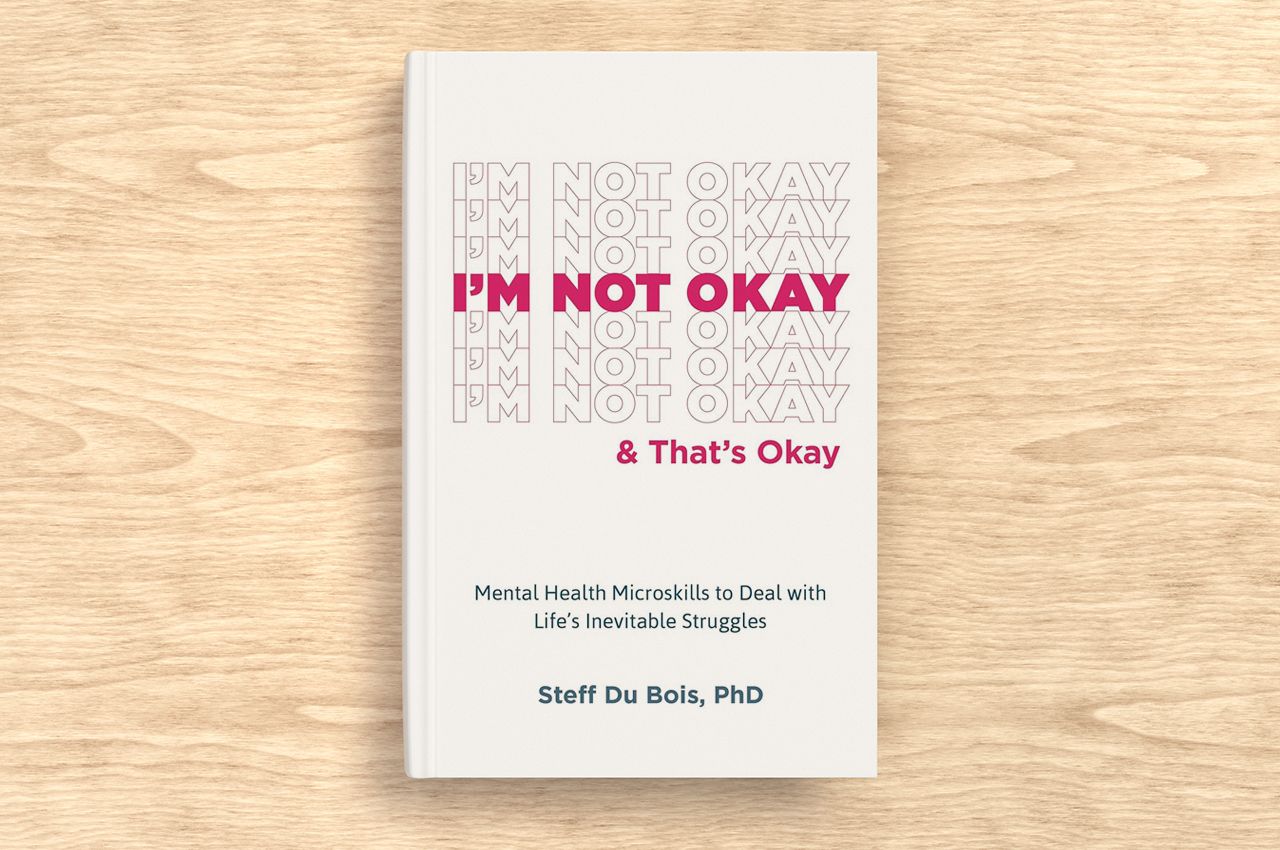From Post-it Notes to Publication: Illinois Tech Professor’s New Book Teaches Therapy Skills

Making therapy more affordable and accessible to the world is a gargantuan task.
One might ask: Where do I even begin such a project?
For Steff Du Bois, a clinical psychologist and associate professor of psychology at Illinois Institute of Technology, the first step was a small one: Post-it notes.
Seeing an increased demand for mental health support as COVID-19 swept across the globe in 2020, Du Bois began to write down therapeutic strategies—often with “punny” names—that he discussed with clients on Post-it notes. In compiling all of these strategies, which Du Bois calls microskills, his book, titled I’m Not Okay and That’s Okay: Mental Health Microskills to Deal with Life’s Inevitable Struggles, was born.
A champion of health equity, Du Bois hopes that this book—published on November 1, 2023—can help people who either can’t access or don’t want therapy, specifically, to learn therapeutic skills without having to step foot in a therapist’s office.
“The book isn’t necessarily a substitute for therapy, but I think it is a source of the skills that you might get in therapy,” says Du Bois. “It’s a way to access therapy skills without the therapist, without the insurance coverage that you need.…A therapy session can cost over $200; the book costs less than $20. So for less than $20, you can get a year’s worth of therapy skills.”
Each of the book’s 52 chapters are framed around a specific struggle one might be having, one microskill to cope with that struggle, and an exercise at the end of each chapter that is meant to help the reader understand and use the skill in their everyday life. Du Bois chose to break the book into 52 chapters—each with a different, common struggle—to mimic a year’s worth of skills developed through weekly therapy sessions.
In one example, Du Bois talks about the acronym he made up and calls DODI (Dread of Doing It), which is the opposite to the more well-known acronym FOMO (Fear of Missing Out), which many of us experience.
“If your struggle is dread, or avoidance because you dread doing things, there’s a two-page chapter to read to try to work through that, and then an exercise associated with it to practice the skill,” says Du Bois. “The microskill tries to get at the underlying mechanism that perpetuates that experience. If it’s dread, what may be happening is you’re having negative automatic thoughts that are telling you, ‘Ugh, this is going to suck.’ The microskill targets those automatic thoughts to try to correct or change them.”
Other struggles highlighted include self-critique, feeling overwhelmed and wanting to make it stop, starting new habits, sudden negative emotions, and sleep.
Shrinking these strategies down into bite-sized microskills, Du Bois hopes that the reader is more easily able to cope with whatever issues they’re confronted with.
“On the back [of the book] it says, ‘Little strategies for big relief.’ I think that’s the idea,” says Du Bois. “The microskills are very approachable, very simple. They’re accessible, they’re usable. They’re small strategies, but they can pack a punch….Each is a combination of empirically supported skills from the literature, but then also my own clinical experiences with clients that have allowed me to frame these skills in a way that makes them approachable and sometimes even a little bit fun.”
One of the biggest struggles that Du Bois faced over the nearly three years he spent writing the book was learning how to frame these microskills for consumption on the page, rather than one on one in therapy, as he’s most used to doing.
“I think I have a strength of framing ideas in a unique and effective way for clients during therapy sessions. Now taking that and transposing it into book form, that itself felt like a whole new skill set for me to learn,” says Du Bois. “For me, that was probably the most challenging: taking my own system I thought worked, but altering it for a new medium.”
Du Bois hopes readers connect with this new medium and use these microskills in a way that works for them. “Just like you might read another book at your own pace—a chapter a week, or three chapters in one day—you can read this book at your own pace, whenever it suits you to help you cope with life’s inevitable stressors.”




